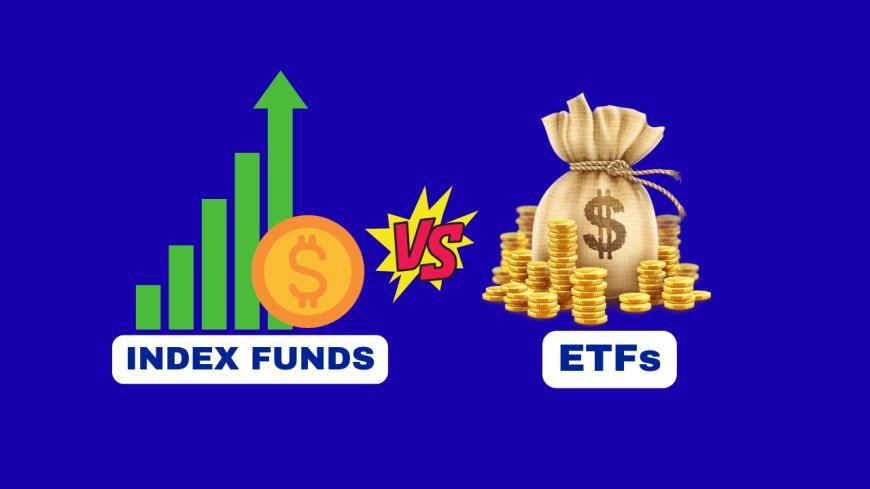Index Funds vs. ETFs for Beginners in 2025: Your Simple Guide to Smart Investing
This article offers a beginner-friendly guide to choosing between index funds and ETFs in 2025, tailored for everyday people looking to grow their wealth without stress. It breaks down the basics, costs, and practical tips for incorporating these investments into a balanced financial lifestyle, making investing feel approachable and achievable.

Investing can feel like learning a new language, especially if you’re just starting out. But in 2025, two options—index funds and ETFs—make it easier than ever to grow your money without needing a finance degree. Whether you’re saving for a dream vacation, a cozy home, or just financial freedom, these low-cost, beginner-friendly investments are perfect for your lifestyle. Let’s break down what index funds and ETFs are, how they differ, and which might fit your vibe best.
What Are Index Funds and ETFs?
Index Funds are like a group savings plan. They pool money from lots of investors to buy a big basket of stocks or bonds that match a market index, like the S&P 500. Think of it as a low-effort way to invest in hundreds of companies at once, with steady growth over time.
ETFs (Exchange-Traded Funds) do something similar, tracking indices, but they trade like stocks on an exchange. You can buy or sell them anytime during the trading day, giving you more control and flexibility. Both are affordable and diversify your money across many companies, reducing risk.
How They Fit Your Lifestyle in 2025
1. Costs: Keeping More of Your Money
-
Index Funds: Super low fees, often 0.03%–0.2% (e.g., Vanguard’s VTSAX at 0.04%). Some require a starting investment of $500–$3,000, but many brokers now offer no-minimum options.
-
ETFs: Equally cheap, with expense ratios like 0.03% for Vanguard’s VTI. You only need enough for one share—sometimes just $10–$100—making them perfect for smaller budgets.
Lifestyle Fit: Both are budget-friendly, so you can invest without sacrificing your coffee runs. ETFs are great if you’re starting small, while index funds suit those ready to commit a bit more upfront.
2. Flexibility: Investing on Your Terms
-
Index Funds: You buy them at the day’s closing price, so it’s a “set it and forget it” vibe. Perfect if you’re busy juggling work, family, or Netflix binges.
-
ETFs: Trade all day, so you can jump in or out when inspiration strikes. Love staying on top of trends? ETFs let you act fast, like grabbing a tech ETF when AI stocks are buzzing.
Lifestyle Fit: Index funds are for planners who love automation, while ETFs suit those who enjoy a hands-on approach, tweaking their investments like a playlist.
3. Ease of Use: No Stress, Just Progress
-
Index Funds: Many let you set up automatic deposits, so you can save regularly without thinking about it—like a gym membership for your money.
-
ETFs: You’ll need to buy them manually, which takes a bit more effort but feels empowering if you like control.
Lifestyle Fit: Index funds are your stress-free sidekick for consistent saving. ETFs are for those who get a thrill from making their own moves.
4. Variety: Match Your Goals
-
Index Funds: Stick to broad markets, like the whole stock market or bonds, great for steady, long-term growth.
-
ETFs: Offer fun options, like funds for clean energy or tech giants, letting you invest in what excites you.
Lifestyle Fit: Index funds are your reliable base, like a classic wardrobe staple. ETFs add flair, letting you sprinkle in investments that match your passions, like sustainability or innovation.
Tips for Beginners in 2025
-
Start Small: ETFs like SPY or VOO let you begin with just one share. Index funds are catching up with no-minimum options at places like Fidelity or Schwab.
-
Keep Costs Low: Compare fees—every penny saved is a penny growing. For example, VOO (ETF, 0.03%) vs. VFIAX (index fund, 0.04%) is a close call, but it adds up over years.
-
Match Your Lifestyle: Love automation? Go for index funds. Want to play the market a bit? ETFs are your jam.
-
Dream Big: Investing isn’t just about money—it’s about funding your goals, whether that’s travel, a home, or early retirement. Start now, even with $50.
-
Use Free Tools: Apps like Robinhood or Wealthfront make ETF trading a breeze, and many brokers offer free resources to learn as you go.
Which Should You Choose?
There’s no wrong answer—both index funds and ETFs are awesome for beginners in 2025. If you want a hands-off, “grow while I sleep” approach, index funds are your best friend, especially with automatic investing. If you’re excited to start small, explore trendy markets, or make quick moves, ETFs give you that freedom. Many savvy beginners mix both: index funds for the core of their portfolio and ETFs for a splash of personality.
The key? Start investing now, even if it’s just a little. In 2025, with markets buzzing and platforms making it easier than ever, you’re ready to take control of your financial future—one smart, simple step at a time.
For a deeper dive into these investments, check out the guide: Index Funds vs. ETFs in 2025: Best Choice for Beginner Investors.
What's Your Reaction?
 Like
0
Like
0
 Dislike
0
Dislike
0
 Love
0
Love
0
 Funny
0
Funny
0
 Angry
0
Angry
0
 Sad
0
Sad
0
 Wow
0
Wow
0


























